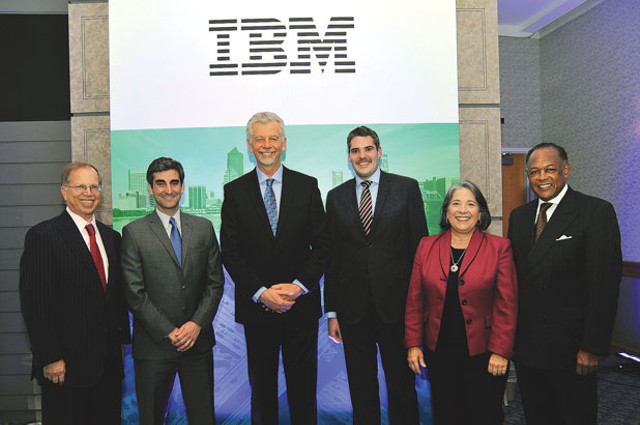Published March 27, 2013 at 8:15 a.m.
The last time a Burlington mayor proposed partnering with a multinational corporation to reduce the Queen City’s carbon footprint, things ended badly. In 2010, Bob Kiss encountered pushback from city council and a revolt from his Progressive base for inking a deal with Lockheed Martin on its “Carbon War Room” initiative.
So far, no one’s batting an eye at Mayor Miro Weinberger’s willingness to welcome IBM consultants to town for a three-week brainstorming session on ways to reduce Burlington’s greenhouse-gas emissions. Perhaps it’s because this multinational has local ties.
Last year, Burlington became the smallest city in the United States — and the second smallest in the world — to win an IBM “Smarter Cities Challenge” grant. The global technology giant’s three-year, $50 million initiative is helping 100 cities around the world become safer, sustainable and more livable — at no charge to taxpayers. Each city had to identify an urban problem for IBM to tackle: In Burlington’s case, how to use energy more efficiently and lower its utility costs.
The team of six consultants from IBM’s worldwide staff arrives on Monday, April 1. During the first week, they’re scheduled to meet with city officials and representatives from Burlington Electric Department, the University of Vermont, Fletcher Allen Health Care, Champlain College, Chittenden County Transportation Authority and other stakeholder groups. During week two, the team will sit down, roll up its sleeves and begin crafting possible solutions. In week three, it’ll reconnoiter with the mayor, city council, stakeholders and the public and offer its recommendations for making improvements as cost effectively as possible.
Burlington has no obligation to heed IBM’s advice or to buy any of its products. Says Weinberger, “The only obligation we’ve made is to engage them while they’re here.”
Likewise, IBM doesn’t provide the city with any cash to implement its recommendations; the $400,000 “grant” is simply the value of the company’s donated time and expertise.
Big Blue’s motives aren’t entirely altruistic. Nearly every grant recipient has an existing relationship with IBM, so the corporation is already familiar with each city and the challenges it faces. IBM Essex Junction — often referred to globally as “IBM Burlington” — is Vermont’s second-largest private employer. Part of IBM’s goal is to make the communities in which it operates more livable and thus more attractive to potential employees. “It’s definitely a win-win situation,” says corporate spokesperson Ari Fishkind.
IBM also looks for a city that has “leadership that wants to see positive change ... and has actually taken steps to make it a reality,” Fishkind explains. That helped Burlington’s case, he says, because its “progressive, energetic and forward-thinking leadership” had already made carbon reduction “a top priority.”
Weinberger’s take: IBM doesn’t “want to bring in people from around the world, do a big report and then have it sit on a shelf somewhere.”
Fishkind won’t reveal the names of the six Burlington-bound experts except to say that they come from Germany, France, the Czech Republic, Brazil, Rochester, N.Y., and Oregon. The team won’t include any Vermont IBM personnel. The idea, Fishkind explains, is to get fresh eyes on the problem.
You could say Burlington has a carbon conundrum. In 2007, a citywide inventory of greenhouse-gas emissions showed the city generated about 397,000 tons of carbon dioxide annually. At the time, the city’s Carbon Action Plan called for a 20 percent reduction of 2007 emission levels by 2020 — or 1.5 percent annually.
But a 2010 inventory of emission levels revealed that Burlington had generated 423,542 tons of carbon dioxide — a 7 percent increase over 2007.
It wasn’t because of Burlington Electric, which actually lowered its carbon footprint during that period. In the city’s grant application, the mayor’s assistant on special projects, Carina Driscoll, pointed out: “The reality is that many of the greenhouse-gas-reduction efforts in the Climate Action Plan are moving forward in silos.”
The IBM team promises to bring a big-picture view to the table. Two years ago, a Chilean city with a population of around 360,000 asked IBM for advice on improving sanitation and reducing its water consumption. When the team arrived on site, it discovered more pressing issues, including public safety, health, education and economic development. In the end, the Smarter Cities team recommended a variety of broader solutions — including one that could ultimately reduce the city’s irrigation costs by as much as 60 percent.
As Fishkind put it, “The aperture definitely widened.”
Similarly, in 2011 St. Louis asked IBM to examine its policing strategies. A nationwide drop in violent crime hadn’t reached St. Louis and its reputation as “the most dangerous city in America” was driving away local residents and businesses.
The IBM team found the city’s criminal justice system — police, prosecutors, courts, corrections, probation and parole — weren’t sharing information effectively about their worst offenders, who were responsible for a disproportionate number of the crimes. The system lacked accountability and objective metrics on crime.
“Police, prosecutors, courts, probation and parole are all doing their job, and they may be doing it very well,” St. Louis Mayor Francis Slay told The Beacon last year. “But they are not all answering to the same authority. They are doing the job in silos and not sharing information as much as they could.”
After IBM’s team recommended focusing on certain “hot spots” of criminal activity and taking a “tough-love” approach to the most hardened criminals, the city was able to dramatically reduce the crime rate in some neighborhoods.
Glasgow, Scotland asked IBM to address the problem of “fuel poverty” — that is, residents who were spending more than 10 percent of their household income on fuel costs. After three weeks, the IBM team offered 60 different recommendations to increase “affordable warmth.” One was a program that provides heating assistance to the city’s elderly residents, paid for with proceeds from renewable-energy projects.
Why did Weinberger’s team ask for help on a huge problem like greenhouse-gas reduction instead of focusing the fix-it folks on the Moran Plant or Burlington Telecom? As the mayor explains, the problem had to have a data-management component. IBM excels in helping its cities process massive amounts of new information, glean relevant findings from it, then communicate it effectively to many stakeholders.
In Burlington’s case, BED has nearly completed the rollout of its smart-grid technology, which includes meters that every 15 minutes report back to headquarters each user’s energy consumption. BED’s challenge: what to do with all that new data.
As Burlington prepares for IBM’s arrival, the scope of the problem under consideration has already widened. Ken Nolan, manager of power resources at Burlington Electric, says the list of stakeholders has grown to include those involved in district heating, transportation, permitting and green-energy projects — in short, a more “global” perspective on Burlington’s contribution to global warming.
Will Burlingtonians be receptive to IBM’s recommendations?
“I think there’s some wariness about how this will all go once IBM leaves,” Nolan admits. “But I don’t think we know yet. We really just have to let this play out.”
Advice from Tucson, Ariz., which landed its own Smarter Cities grant: Be flexible and open to new ideas. Tucson asked IBM to help Tucson Water, a municipally owned water company, to conserve more water, identify leaks faster and reduce the energy cost of delivering water to an arid city of more than 700,000 people.
As BED has done with smart-grid technology, Tucson Water is upgrading its water meters to a system that will dramatically increase the amount of information it gathers on how, when and where water is consumed. The utility’s challenge was to figure out how to manage all its new data.
“It was definitely a positive experience,” reports Tucson Water spokesman Fernando Molina. “Even before it started, we were all really excited because we knew IBM had the top people in these fields to come and basically give us an outsiders’ look of what we’re doing.”
In the end, IBM offered Tucson Water some technical and practical advice. Among their recommendations to the utility was to build a better website. One of its biggest problems was high call volume — on average, more than 2600 a day. IBM discovered a third of those calls were from customers who lacked basic information about their own water usage.
When they weren’t geeking out, Molina says the IBM team members were “pretty much embedded in our community. We found out that when they went out to eat their meals, they would talk to everyone — their servers, the other people in the restaurant, the cooks.”
Ruby Perry, an organizer for the climate action group 350 Vermont, didn’t know the IBM team was coming to Burlington, but she hopes it will offer some “outside-the-box” recommendations for reducing fossil-fuel consumption, such as making streets more bike-friendly and four-day workweeks for city employees.
“There are all these ways of reducing emissions instantly without any output of money whatsoever,” Perry says. “It just takes a great amount of creativity from employers.”
More By This Author
Speaking of...
-

Stamford Wind Proposal Tests Whether Large Turbines Have a Future in Vermont
Nov 22, 2023 -

Vermont to Open $20 Million Business Flood Relief Fund
Jul 27, 2023 -

Video: Following Seven Days' Paper Trail to Québec
Jun 21, 2023 -

Rochester Grocery Store to Close, Leaving Residents in the Lurch
Apr 24, 2023 -

Video: Saying Goodbye to Burlington’s Penny Cluse Café
Nov 17, 2022 - More »
Comments
Comments are closed.
From 2014-2020, Seven Days allowed readers to comment on all stories posted on our website. While we've appreciated the suggestions and insights, right now Seven Days is prioritizing our core mission — producing high-quality, responsible local journalism — over moderating online debates between readers.
To criticize, correct or praise our reporting, please send us a letter to the editor or send us a tip. We’ll check it out and report the results.
Online comments may return when we have better tech tools for managing them. Thanks for reading.














































